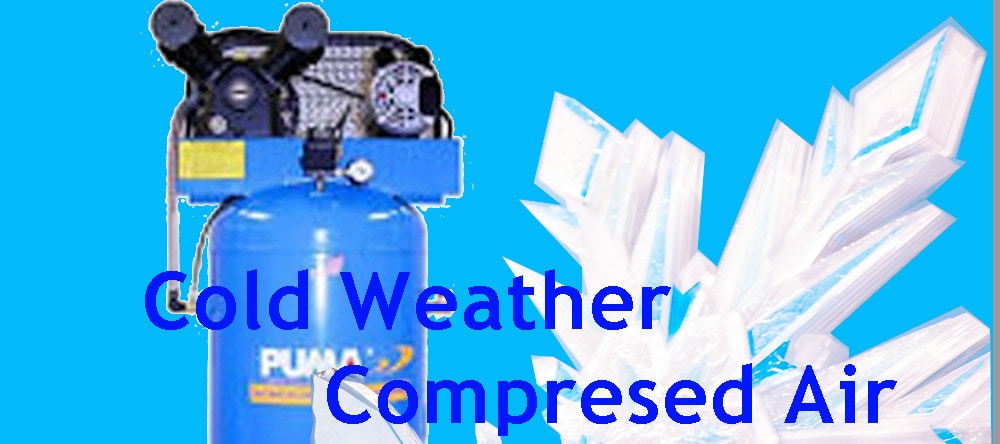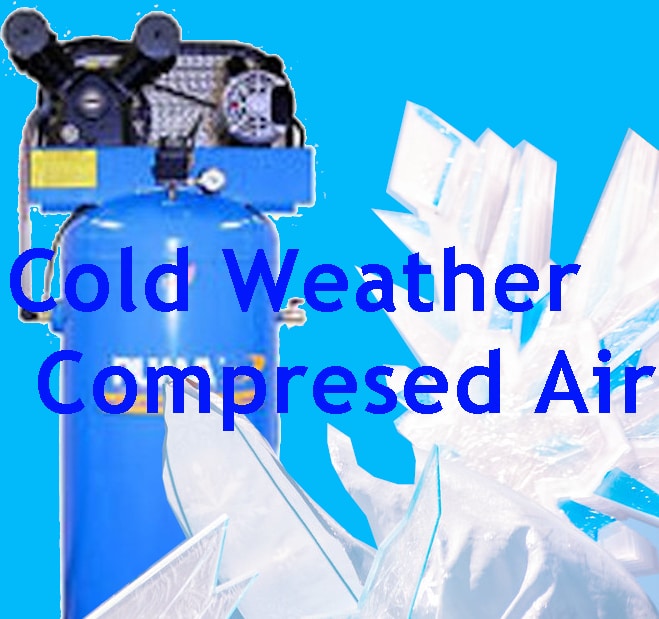
Everything You Must Know About Using Air Compressors in the Cold
If you rely on your air compressor for your work or home projects and live in a place that gets bitter cold for months at a time, you probably want to know about how to keep your equipment in good working condition. Extreme temperatures can be rough on even the most challenging equipment.
So, can air compressors safely be stored in the cold? The answer is no. According to Compressor-Pump & Service, Inc., air compressors tend to run best in temperatures between 41- and 95-degrees Fahrenheit (5- to 35-degrees Celsius). Below that temperature, the air compressor will not perform to its best abilities and possibly get damaged.
Most garages are not well insulated or heated, exposing your tools to extreme temperature shifts due to weather. As the season moves from fall to winter, you may wonder if it’s a good idea to protect your investments from extreme weather. We’ve done the research to help you understand why air compressors need warm temperatures and how to protect the equipment from the icy cold.
Can You Store an Air Compressor in the Cold?
Air compressors do not do well in cold temperatures and work best in room temperature or slightly warm conditions. However, there are ways to care for your air compressor to work well in colder temperatures or after being stored in cold climates.
REMEMBER: These are just general care tips that suit most compressors. Your specific air compressor may require extra steps of care. Always consult your owner’s manual when taking care of your equipment.
Store Your Air Compressor in a Heated Area
As air compresses, it consolidates water, moisture gathers in the tank and lines. Even in high-end compressor systems that separate and filter out moisture, There will always be a condensate build-up. If this condensate is allowed to freeze, these frozen droplets will be pushed into a restricted part of the system, causing further restriction or blockage. When frozen water is left to expand, catastrophic failure to the system could be a result,
To avoid damage caused by this freezing, you should store your air compressor in a heated area. The easiest way to achieve this for your air compressor is to use a small space heater in close vicinity to store your air compressor.
NOTE: It is NOT safe to leave the heater unsupervised. Only turn on the space heater for short periods. Once the system is above freezing, it should be safe to use.
Drain Condensate Daily!
Since the condensate builds up with every use, it is crucial to keep the compressor drained. This tip applies whether you plan to use your compressor during the winter or not. While using a portable compressor, remember to drain the system before putting it back in storage. When water is not drained before it is put away, that water has the potential to freeze. It could cause damage even if not used while frozen.
It is crucial to drain daily. If you skip a day or two, moisture will build inside, and the condensate could freeze and cause damage to the pipes. I suggest adding this task to your daily chore routine.
Keep the Compressor and Hoses Stored at the Same Temperature, eliminate air Differentiation that causes condensation. As the condensate hits the cold hoses, the liquids will freeze and possibly block the air from flowing.
The best solution would be to also store the hoses in a heated area with the compressor.
Allow Your Air Compressor to Warm Up.
This tip also applies whether you plan to use your air compressor during the winter or leave it in storage. Before using your compressor, you must let it warm up. Even if you made sure to drain the unit before storing it, there still could be some frozen moisture.
If you use your compressor without warming it, the change in temperature and pressure could cause a layer of frost to form in the pipes during use.
Don’t Forget About the Cords.
It is essential to mention that the electrical cords will need to be cared for during the winter. During colder weather, cords can become brittle, so it is best to handle them with care.
It is important not to wrap the cords tightly or allow them to get run over. When storing them, it is best to hang them up loosely.
Can an Air Compressor Freeze?
The answer to this question is a little complicated. Technically air compressors can not freeze, but water, if left within the system, can.
There are two liquids and one gas within a compressed air system at any given time; Air, Water, and Oil. While air does not freeze, moisture within the air in extreme conditions can. The oil will not freeze or crystalize, but the viscosity or ability to flow drops with the cold temperatures. Lack of lubrication will cause performance issues and ultimately damage. According to Kaeser Compressions, condensate is a by-product of the air compression that consists of a “mixture of ambient hydrocarbons, compressor lubricant with ambient moisture, and particulates that have been concentrated and removed from the air stream by filters.”
Take Steps to Avoid Corrosion
Your air compressor will probably come with a system designed to eliminate any unneeded moisture during the compression process. This moisture control system will be less effective during the colder weather since it is outside its recommended temperature use.
This unaddressed moisture in your air compressor could lead to corrosion of the unit’s components over time. By draining the compressor every day, you will deter the effects of corrosion.
Installing air drying systems is a great way to handle colder temperatures. Adding additional dryers will ensure that your air compressor has less condensate build-up. Air dryers are a must
for auto painting as water in the paint will cause fish-eyes small imperfections in the finish.
Adding Auto-drains to the tank can eliminate moisture in the system and are easy to install. Be aware that you should still drain any lines and water separators by hand, This one From Amazon is one that I have used several times.
Always check your owner’s manual for the recommended drainage technique.

